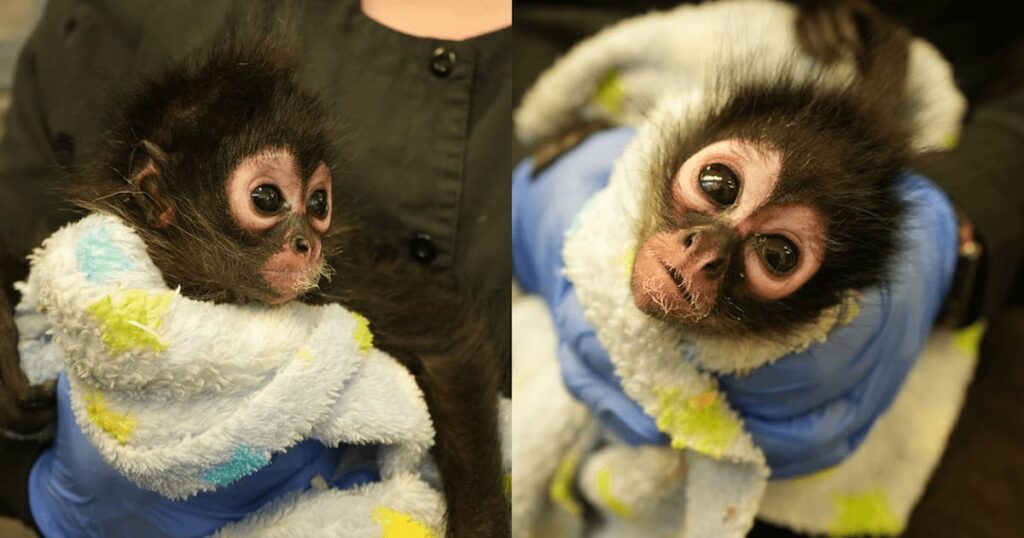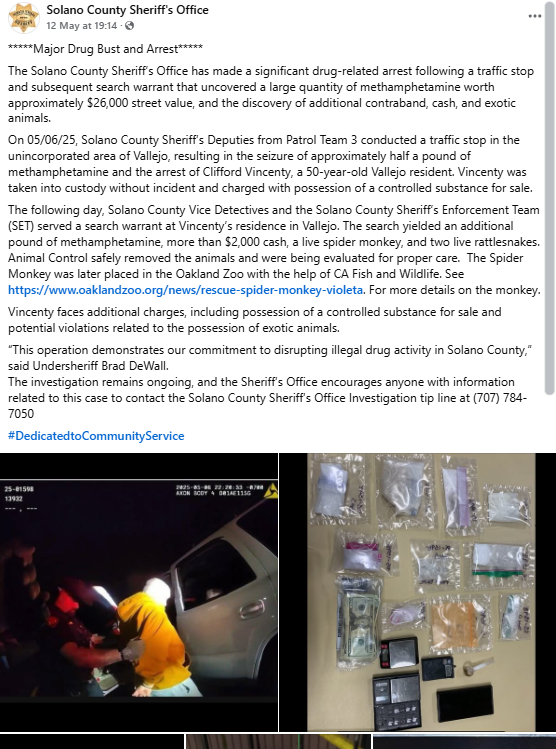Authorities in Solano County, California, uncovered more than just narcotics during a recent drug operation. Officers rescued a baby spider monkey and encountered two rattlesnakes inside a suspect’s Vallejo home.
The unusual find followed a traffic stop on May 6, when Solano County Sheriff’s deputies pulled over a vehicle in Vallejo. Inside the car, they located roughly half a pound of methamphetamine, estimated to be worth around $26,000. A 50-year-old male suspect was taken into custody at the scene.
Due to the volume of drugs recovered, detectives secured a search warrant for the man’s residence, concerned the quantity pointed to distribution rather than personal use.
“That’s a significant amount of meth to be moving around with,” said Sgt. Rex Hawkins, a spokesperson for the sheriff’s office. “When you’re dealing with that level of narcotics, it triggers additional investigative steps.”
During the search of the home, investigators located a juvenile spider monkey and two rattlesnakes, along with another pound of methamphetamine and over $2,000 in cash. The suspect now faces multiple charges, including possession of narcotics for sale and unlawful ownership of exotic animals.
Animal Control officers removed all three animals from the property. The spider monkey—a female—was transported to the Oakland Zoo for evaluation.
According to a statement from the zoo, the young monkey, named Violeta by staff, is believed to be approximately 18 months old. She is undergoing a full medical workup including a CT scan, physical examination, and blood testing. While her overall condition is stable, the zoo has placed her in a temporary care unit, outfitted with soft bedding, fresh produce, and nutritional formula to support her development.
“Wildlife trafficking is a growing conservation crisis, driving countless species, like spider monkeys and other nonhuman primates, toward extinction. These animals are often exploited through the exotic pet trade, kept in unsafe, inhumane conditions that threaten both their welfare and public safety. The Captive Primate Safety Act, recently introduced in Congress is a critical step toward ending this exploitation by banning the private ownership of primates and reinforcing our national commitment to responsible wildlife protection,”
Isabella Linares, spokesperson for the Oakland Zoo, noted that while the facility does not currently house spider monkeys on public exhibit, they did care for a rescued individual earlier this year. That animal has since been relocated, and plans are now underway to secure a long-term, species-appropriate home for Violeta.
The zoo emphasized that keeping primates like spider monkeys is illegal in California. In addition to being protected under state law, spider monkeys are classified as endangered and are commonly trafficked across international borders.
“There’s a perception that they make good pets because they’re small and look adorable,” Linares explained. “But they’re wild animals. They have specific needs, and without proper care, their physical and emotional well-being suffers.”
She added that while Violeta’s origin is unclear, she may have been trafficked from Chiapas, Mexico, a region known for its native spider monkey populations.
“People often underestimate how quickly these animals grow stronger and harder to manage,” Linares said. “Even if they appear affectionate, they don’t socialize like humans. They’re still wild, and they can behave unpredictably.”
The investigation into the monkey’s origin is ongoing, as is the effort to find her a permanent sanctuary.









